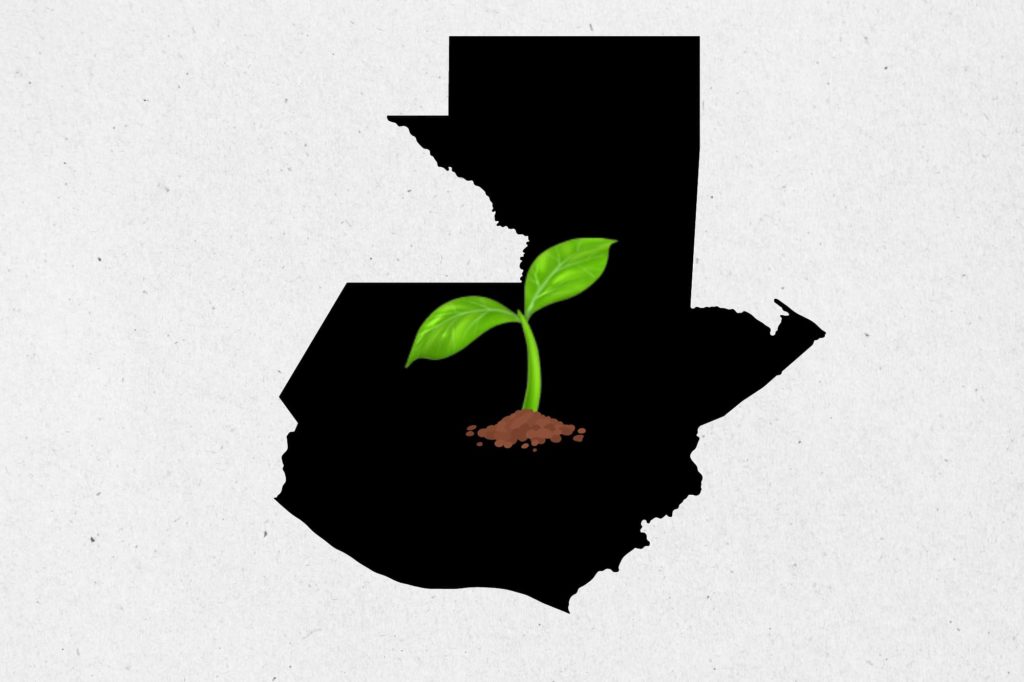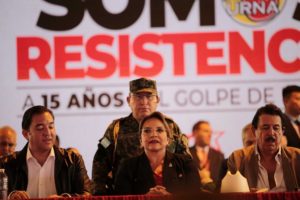Text: Otto Argueta
Photography: Persy Cabrera
Translated by: José Rivera
No one saw it coming. Not the polls, experts, political strategists, or the public, no one. We were disheartened, as it usually happens when darkness clouds our hopes for the future. We expected the worst, two female candidates from political parties made up of questionable people, some of whom have been criminally convicted. We expected that institutions would fail and benefit what we call «the pact of corruption», nothing more than the culmination of a State run by criminals and opportunists, a political elite without any respect for democracy and a voracious appetite for power and business. There wasn’t any balance in power, not in political parties, society, or the international community.
We get wrapped up in pessimistic discussions about «who is the “lesser of two evils”», knowing that the electoral process seemed like a fight between criminal groups using weapons provided by institutions, some in the Supreme Court, others in the Constitutional Court, the Supreme Electoral Court, the Public Prosecutor’s Office, the Executive branch, in all institutions. The wealthy, as always, support candidates who are more likely to win the electoral race. It was devastating to know that any option will result in four more years of the status quo, or maybe worse, in a consolidated dictatorship or decentralized kleptocracy. It made no difference.
Bernardo and his party, Semilla, didn’t see it coming either. The best scenario was to secure at least the same number of representatives in Congress. Semilla is a political party born from the protests in 2015 and founded by a group of academics, experts, experienced members of civil society, and a few young men and women inspired by the respect some members of the movement instill. With a modest presence in a congress dominated by criminals, they proved slowly but surely that it’s worth saying «not everyone in Congress is corrupt and criminal». They launched a creative electoral campaign that captivated young middle-class men and women from the cities, many of them university students. They gradually identified with a democratic discourse that challenged power. «The unlikely result of both conviction and perseverance!», said Bernardo with surprise in a message days after the first round of elections. Unlikely, conviction, and perseverance; are three key and accurate words from a down-to-earth and highly ethical person.
Those corrupt politicians, who were facing each other, didn’t see it coming either. Their illegal and desperate reactions clearly show how concerned they are.
It was not a sudden surprise, we slowly and with much skepticism raised our eyebrows. Guatemala is a country with many shadows, it’s hard to believe it’s gonna be calm after the storm, that we’ll see a rainbow or blue sky because we have been through storms for so long that have caused so much suffering it becomes apparent in our eyes, our pessimism, and the crude, dark, sarcastic, and gloomy humor we are known for; the silence and mistrust we disguise with politeness and courtesy: «don’t worry about it», «it’s my pleasure».
The next day, on June 25, skepticism had taken form: «What the hell? Semilla made it to the second round of elections!»
Bernardo Arévalo is the proud son of Juan José Arévalo Bermejo, the first president elected in the decade of democracy which began in 1944 after the civic movement — or revolution, it depends on the historian’s enthusiasm— that overthrew the dictator Jorge Ubico. In four years, Arévalo modernized the precarious Guatemalan State with precise but fundamental measures: he ratified labor laws, created a welfare system, started processes to professionalize the military, laid the foundations to diversify the economy and overcome the burden caused by monocultures of banana and coffee, among other decisions that are still relevant today. Jacobo Árbenz, the second president in that decade, radicalized these reforms by ratifying Decree 900, an agrarian reform that went beyond what the wealthy and military in the country tolerated. In his book, «Revolutions without revolutionary changes» (Revoluciones sin cambios revolucionarios), the founder of Semilla, Edelberto Torres Rivas, describes that decade not as a revolution, but as a reform that adjusted the hands of the clock in Guatemala to the capitalism of that time. But that was too much for Guatemala, the United Fruit Company, and the government of the United States. Democracy is not profitable for the business of maintaining the status quo and, like now, anything that challenges that notion represents a threat which was known as communism back then.
Árbenz was violently overthrown in 1954 by a sector of the military he himself modernized, by an oligarchy threatened by his radical reforms, by the conservative catholic church and the United States, blinded by the paranoia of anticommunism and the Cold War, and also their business interests in the hemisphere. «Shattered hope» (La esperanza rota) is the title of the book by Piero Gleijeses about that decade and that’s exactly what happened after the coup that overthrew Árbenz: the horror that —once again— Edelberto Torres Rivas described as collective suicide.
In July 2023, 5.57 million Guatemalans, from an electorate of 9.36 million, voted. That’s 59.45%, 2.4% less than in the previous elections. That Monday, 69 years after the interruption of the democratic decade in Guatemala, people could hardly believe that Bernardo Arévalo of the Semilla party had obtained 11.77% of the vote and Sandra Torres of the Unidad Nacional de la Esperanza party 15.86%. If Bernardo made it to the second round of elections by winning a small percentage of the votes in his first run as president, something unusual was happening in the history of elections in Guatemala.
Skepticism turned into doubt trying to make sense of what happened, the logic within our narrow frameworks of analysis. But there isn’t any, not within those frameworks.
We must accept that we, social scientists, are terrible at making predictions. The theoretical tools we use have been designed to analyze the past, not the future, and no sane person should try to do this. We are stuck in observations we consider immutable because they are consistent. We are easily led into determinism, if not historical, at least fatalistic because those predictions reaffirm observations we are certain about. If we take the position we should, as observers looking at the past, with humility we notice there is something that leaves its mark in historical milestones, important question made by historians that have been repeated for generations and have their origin in particular events, that is contingency, the combination of luck and opportunity, the unforeseen and the unexpected.
Sociologist Niklas Lyhmann defined contingency as that which is not necessary and impossible. Basically, it’s about what we have not foreseen because it’s outside our range of observation pushed aside from what we consider the inevitable path in a social process because we only look at what supports it. Those events, which seem casual, in fact plague the history of nations and when they build up change in society is possible.
Here’s the surprise. According to every single poll and analyst (myself included), Semilla did not stand a chance. It’s considered a small and honest party that doesn’t have the financial resources other parties obtain by negotiating with the wealthy and criminals. Zuri Ríos, daughter of General Efraín Ríos Montt, and Sandra Torres had those resources, but not Bernardo Arévalo. He is well known in Guatemala and abroad as an academic, a former diplomat who expresses his deeply-rooted ethical, democratic, and conciliatory values with a very refined use of the language. His performance as congressman of the modest Semilla party earned him the respect of more people.
For Guatemalans, who are used to elections won by a powerful propaganda machinery, Semilla’s campaign seemed insignificant, if not naive: who would profess democratic and ethical values to win an election in a country ruled by a kleptocracy? A party like Semilla is not necessary to continue a criminal system that dominates the Guatemalan State, we thought. But it is also not impossible because, given the unexpected combination of effects, a contingency can lead to a new path.
Let’s not forget that before the elections it was clear that criminal organizations entrenched in public institutions were against one another. Three very different political parties did not participate in the elections and the reasons for this gave us a glimpse of the conflict between corrupt politicians. Those three political parties, indignant and angry, discredited the Supreme Electoral Court and called for large-scale spoilt votes. In addition to this, people are tired and we tend to see them as apathetic because we expect them to go out and protest in the streets like they did in 2015. But precisely because people are tired, distrustful and have had enough, election day is the perfect time to express those feelings. I don’t understand why we insist on trying to predict elections, they are the sum of thousands of individualities and emotions that are only true in the mind of each person, impossible to understand precisely from outside and in advance. Maybe the Guatemalan people rejected the corrupt political system and the fact that it was shown in the ballot box is proof that democracy, with a very weak heartbeat, is still alive in Guatemala. We did not expect this, but it turned out that 17.38% of the votes were invalid, more than the votes cast for Sandra Torres.
We don’t know how many votes for Semilla were cast by Guatemalans who thought «I want my vote to count, I rather vote for the only honest candidate because the rest are more of the same». In other words, corrupt or loaded with a conservative discourse of hatred that has already caused so much damage. What we know for certain is that it was enough for Semilla to make it to the second round of elections and for the rest of the candidates, we hope, to be buried in the Guatemalan political graveyard.
What has happened in the weeks after the election can be evidence of two situations: on the one hand, the urge of criminal groups to correct a trajectory determined by that contingency, Semilla making it to the second round of elections. They do this through different tricks to question the legality of the elections by burdening it with the collusion of corrupt public officials. On the other hand, we see the effect of an outlet that people found for their frustration. From mere contingency, Semilla became a possibility.
In Guatemala, as impulsive as we are when we talk about something we tried and didn’t work out the way we intended, we say «it backfired on us». Actions to discredit Semilla and to remove Bernardo Arévalo from the electoral run had the opposite effect, public support for him has increased and his persona of possibility has grown rapidly.
The second round of elections is going to take place in August and many things could happen, we don’t know what exactly, but we do know that what Semilla accomplished was a contingency that could now become a new path, one that makes us believe again that democracy is possible.
The crisis is an opportunity for Semilla and to no longer be an outlet but a possibility of change. Semilla was at the right place, where unrelated events converged. Conviction and perseverance, like Bernardo said. That was Semilla’s most important achievement at that moment. The next step is to take advantage of that outlet and it’s the responsibility of the party and its supporters, convinced and changed by Semilla and the current circumstances, to seize that opportunity. We should not rely on chance but try to anticipate what is coming.
We can also wait for the criminal groups to go back to what benefits them, to become stronger, more organized, and radical. Or that they try to seek impunity in this new order, they have plenty of experience doing so.
We know little about the next step we are taking as a society, we are walking into a minefield. Many things could happen between now and August 20, when the second round of elections takes place. There are many possible futures, and in one of them, Bernardo Arévalo is elected president of Guatemala. Semilla can form strategic alliances and strengthen its positive and enthusiastic campaign. This achievement is very meaningful, it has given us hope that maybe democracy is the way out of this labyrinth.






